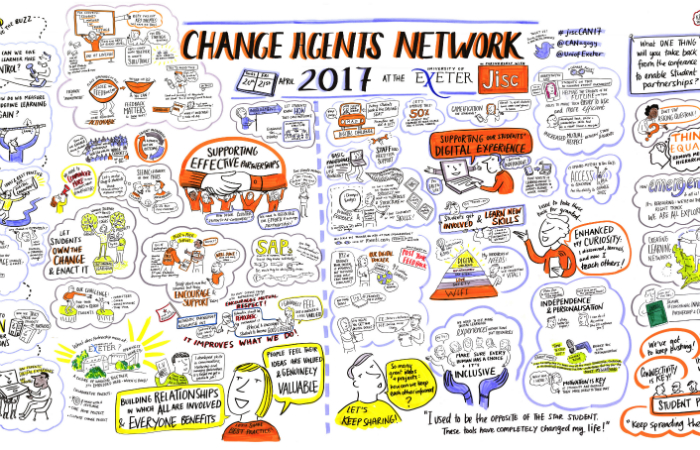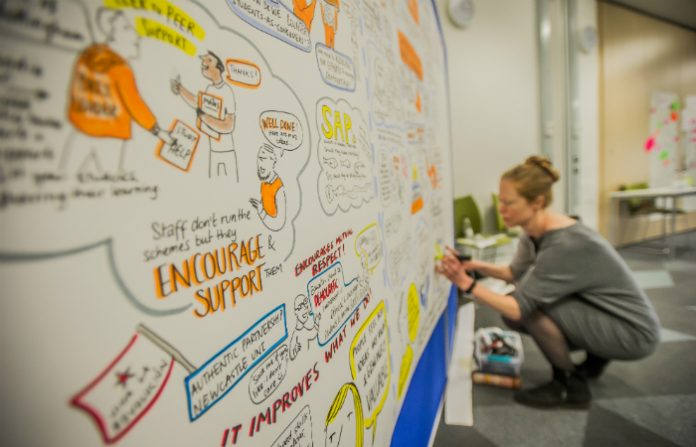Working with students to stimulate positive change in universities is increasingly becoming standard practice across the sector. Sarah Knight has overseen the development of Jisc’s Change Agents’ Network (CAN) which was set up in 2013 to support that. She reflects on this year’s CAN conference and the benefits the network has spawned since its launch.
Student ‘change agents’ work in partnership with staff to lead, support or develop change within an institution. The latest UCISA Digital capabilities survey reports that 43% of respondents are already working in partnership with students to facilitate change, with another 38% of respondents working towards this goal.
There are different roles for student change agents, from leading their own change project to supporting a defined initiative or taking part in institutional processes such as staff recruitment and teaching practice observations. Titles may differ across higher and further education and include champions, change agents, digital leaders, student fellows, student ambassadors, student partners, student researchers, co-designers, co-creators, co-developers.
I was privileged to work with with the University of Exeter this year to organise the 5th annual conference of the Change Agents’ Network which took place on the 20–21 April. It was attended by 180 staff and students from universities and colleges across the UK. This year’s theme, “Supporting Effective Partnerships”, was fitting, as we now see student-staff partnerships as accepted practice in supporting innovation in universities and colleges, whether that be in curriculum design, supporting the development of staff and student digital capabilities, or as researchers.

Students as change agents and student partners
In recognition of the value that students play in driving change in their institutions, Jisc established CAN five years ago with Simon Walker from the University of Greenwich and Mark Kerrigan from Anglia Ruskin University supporting its developments. It’s grown into a community-sustained network of practice supported by the annual conference, and has its own journal, the Journal of Educational Innovation, Partnership and Change which is about to publish its fourth edition, offering students an opportunity to publicise the outcomes of their work. In addition, Jisc has produced guidance and examples of how colleges and universities are developing successful student partnerships.
Since 2013, I have seen how student-staff partnerships have grown to become established practice from the pockets of often project-based initiatives. This year it was evident how colleges and universities are embracing the true meaning of partnership (explained here by Mick Healey, Abbi Flint and Kathy Harrington): “Partnership is fundamentally about a relationship in which all involved – students, academics, professional services staff, senior managers, students’ unions and so on – are actively engaged in and stand to gain from the process of learning and working together”.
Over the two days of the conference, we saw how senior leaders are strong advocates for student partnerships with University of Exeter professor Tim Quine, deputy vice-chancellor (education) and Mike Shore-Nye, registrar and secretary showing their support. With over 50 colleges and universities presenting their innovative work, there were excellent examples of institutional practice. What struck me the most, was how confident and articulate student presenters were on sharing their work and more importantly the benefits they had gained from their experiences. The wordle graphic below illustrates the benefits students have realised on working as change agents or student partners in their organisations.

How are institutions putting this to work?
Student engagement at Birmingham City University is encouraged through a number of schemes including Student Academic Partners, Student Academic Mentoring Partnerships and Collaborative Partnerships. This means that student engagement is not confined just to the curriculum but is woven into the fabric of the whole student experience – more about this work here.
Working in partnership with students to evaluate and enhance the student experience is at the heart of the University of Lincoln’s philosophy, whether that relates to teaching or service provision. The student engagement team work with students and staff to consider the impact on the student experience and develop meaningful engagement.
Explore how student engagement initiatives such as restructured subject committees, work shadowing between students and the executive team, student representation on interview panels and the work of engagement champions are making a positive impact on the student experience (find out more here).
iChamps at the University of Southampton work alongside staff partners in academic units and faculties across the university to identify and develop digital initiatives according to the needs of academic teams and the interests of students. iChamps are extending their reach and embedding the work of the iChamps network by linking digital developments with other student-led initiatives such as placements, employability and student engagement.
Mission Employable is another initiative in the school of humanities at the University of Southampton. This student-led employability initiative is run by a team of four student interns, and history lecturer and faculty director of employability, Dr Eleanor Quince. The team is working to improve the employability agenda within the faculty through the development of a zero-credit employability module, the establishment of a peer mentoring scheme and other initiatives.
Where next?
I am delighted to announce that the sixth annual change agents’ network conference – Championing Student-Staff Partnerships in an Age of Change – will be hosted by the University of Winchester on the 19-20th April 2018 so we look forward to continuing the sharing of practice, networking and learning there! If you would like to get involved with CAN2018, please email can@winchester.ac.uk.
What students say they’ve gained from CAN 2017
‘To me, it was a deep honour presenting at such an amazing conference. I did not only gain experience in presenting and learned a lot from others, but had the opportunity to meet with and talk to so many wonderful people!’
Fanni Zsófia Albert, postgraduate student, University of Newcastle
‘I have kept in touch with many of the people I met and I’m sure those relationships alongside the ideas discussed during the conference will be the seed for many great things!’
Mauro Cozzi, undergraduate student, University of Southampton
‘It has been a fantastic two days and great to have seen the development of Jisc and the impacts it has on student engagement for past three years! Thank you for the opportunity to present and share my experiences from presentation, poster and the student panel. Never thought I would be doing it when I first began my projects.’
Kiu Sum, final year student, University of Westminster.
Why not sign up to the CAN mailing list by visiting http://www.jiscmail.ac.uk/CAN to keep up to date with news from the CAN community and to share your own practice with us?








